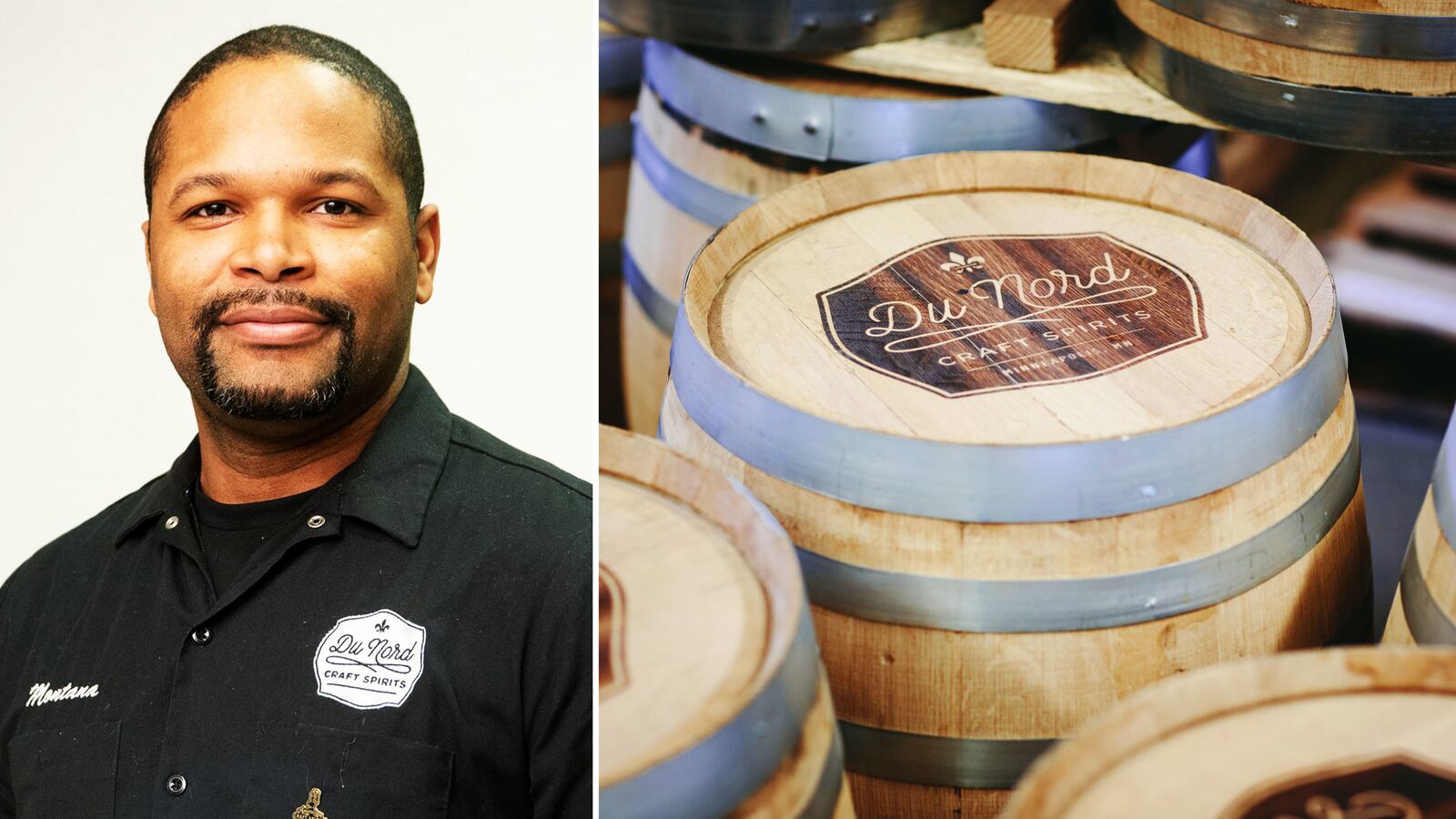On Wednesday, May 27, as day turned into night, the protests over the killing of George Floyd by Minneapolis police officers spread across the city.
The streets in front of Du Nord Craft Spirits, America’s first Black-owned distillery, in South Minneapolis were filled with marchers. The company’s founders, Chris Montana (who is Black) and his wife Shanelle (who is white; both are native Minnesotans), kept an eye on the situation.
“The later it got in the day,” Shanelle said, “the less protest and the more riot started to happen. We pulled our staff back and told them they could go home. They came back a few hours later and started putting up ‘Black-Owned Business’ signs, using anything they could find, old boxes and such.”
The signs worked. The tasting room—with its large windows—and the actual distillery were spared. But the staff didn’t put up signs on the outside of its brick warehouse, where the finished bottles were stored before being shipped out.
“The warehouse was a blank wall, so we didn’t put anything up, and that’s the one they got into,” she said. There was one small window, and the rioters broke that and started fires in the warehouse that triggered the sprinkler system. More than 26,000 gallons of water damaged the bottles in the warehouse, but it saved the distillery from a disastrous fire.
People across the country read about Du Nord’s story and wanted to help, but most of the damage to its facility was actually covered by insurance. So, Chris and Shanelle started a GoFundMe campaign, the Du Nord Riot Recovery Fund, to help their neighborhood rebuild, which is a home to a range of small businesses that are largely owned by people of color. The original campaign goal of $30,000 was fully funded in hours. As I wrote this, the goal has been increased to $1 million, and more than $700,000 has already been raised.
And as the clean-up goes on and the rebuilding begins, Du Nord continues to produce hand sanitizer for All Hands Minnesota, a collaboration with two other distillers in the state to provide local, low-cost sanitizer for folks on the frontlines battling COVID-19.

I imagine you’re getting a sense of just what kind of company this is that Chris and Shanelle have built.
It started about 14 years ago when the two met in Washington, D.C. Chris, was working for the campaign of Congressman Keith Ellison and going to school at the University of the District of Columbia. Shanelle, who has a master’s degree in public policy, was working at a government agency. Chris completed his undergraduate degree and decided to go to Minnesota for law school. By this time, they were a couple, and they moved back home together.
People who know Chris say he doesn’t just do things, he does everything. How else to explain someone who graduated law school, joined a firm, then started thinking about turning the family homebrewing hobby into a business?
“We realized there was an opportunity,” said Shanelle, “a niche market in the rise of breweries. We were homebrewing, so we knew the chemistry behind it. But then we started looking into distilling. They’d lowered the [cost of a distilling] license. Chris says, ‘We should open a distillery. We should buy grains from your parents. They’re in farm country, they’re active farmers.’”
Given their public policy and public service background, it’s no surprise that Chris and Shanelle didn’t see this as just a business opportunity. “There’s this disconnect between rural Minnesota and people in the city,” said Shanelle, “but they really want the same thing at the end of the day. That’s what we worked with, using local grains.”
A “business needs to provide a service, and there’s so much good it can do,” she said. “That’s how we formed Du Nord.” The name of the distillery derives from the Minnesota state motto: L’Étoile du Nord, “the star of the north.”
They looked at several locations and were actually turned down because of safety concerns over producing and storing high-proof alcohol. “When we first approached a number of cities about it,” Shanelle recalled, “they said, ‘absolutely not, you’re going to blow us up!’ But in South Minneapolis, they said, ‘yes, we’d love a small business, welcome!’” The distillery opened back in 2013.
Du Nord is the first Black-owned distillery in modern America and quite possibly in the country’s entire history.
“A lot of spirits brands are owned by African Americans, but this is a distillery, owned and operated,” Shanelle specified. “We’re not the only one anymore.”
When Chris and Shanelle joined the American Craft Spirits Association (ACSA), they quickly got involved in governance of the organization. “Chris realized that ACSA was a great source for young distillers,” Shanelle noted, “but it was and still is a pretty homogeneous group, white people with quite a bit of money in their pockets. So he got on the board and wanted to represent other people. His big driver was making sure it was an inclusive and accepting environment for women and minorities, for everyone,” she explained. “You’ll have [women], people of color coming to ACSA, and no one looks like them. How do we handle that? We needed to adjust that homogeneity. He started an internship program to foster that.” Within a couple years, Chris was ACSA president.
While it was no surprise that Chis excelled at solving policy issues, it turned out he also has some skills making liquor. He is the hands-on distiller at Du Nord, and his spirits have won national awards and proved popular in the distillery tasting room (currently closed for the pandemic) and at retail.
Du Nord has a relatively small range. There’s L’Etoile Du Nord Vodka, Fitzgerald Gin and Café Frieda Coffee Liqueur. There’s also Apple Du Nord Brandy made from Minnesota-grown apples. Rounding out the portfolio is a blended whiskey called Mixed Blood, which has a base of Du Nord’s own high-rye bourbon that is combined with other sourced whiskies.
The donations from their GoFundMe have created the Du Nord Foundation, which has proper non-profit status and is accepting applications for grants to help local businesses clean-up and rebuild.
“We’ve had 35 applicants, and we’re going through the first tranche of grants,” Shanelle said.
But the Du Nord way, the Montana way, isn’t to just focus on the status quo. “A lot of that money could be used for general repairs, clean-up, new glass; for some it might be new equipment,” she allowed. But “Lake Street should not be just what it was, but it has a chance to be better. We’re focusing on entrepreneurial ownership; not just businesses, but property, so the economic benefits of real estate ownership can be in the community. Entrepreneurial efforts are inherently risky, it’s a risk for the owner and their family. Ownership of real estate helps alleviate that. It’s a double whammy, it’s better when you can own the land and the business.”
They’re not just rebuilding the community; they’re taking the opportunity to build wealth in the community.
“We’re in an interesting position,” Shanelle mused. “When we started Du Nord, we were counting change in the couch cushions. Now we can think strategically about equipment, staff, location. Because of COVID, we’re not in a lot of pressure to get the cocktail room open. We are getting production up and running, making hand sanitizer for the community, and our products. We love the area.”
“When you look at the riots, the events…” she said, and paused. “We had a conversation, Chris and I, and there’s not much we can do. It’s tough, and we put it in the hands of the community. South Minneapolis: What are you going to do? The neighborhood is going to figure it out.”


